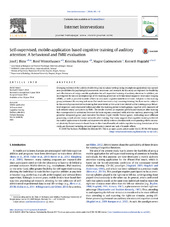Self-supervised, mobile-application based cognitive training of auditory attention: A behavioral and fMRI evaluation
Bless, Josef J; Westerhausen, René; Kompus, Kristiina; Gudmundsen, Magne; Hugdahl, Kenneth; Hugdahl, Kenneth
Peer reviewed, Journal article
Published version
Permanent lenke
https://hdl.handle.net/1956/9555Utgivelsesdato
2014-07Metadata
Vis full innførselSamlinger
Originalversjon
https://doi.org/10.1016/j.invent.2014.06.001Sammendrag
Emerging evidence of the validity of collecting data in natural settings using smartphone applications has opened new possibilities for psychological assessment, treatment, and research. In this study we explored the feasibility and effectiveness of using a mobile application for self-supervised training of auditory attention. In addition, we investigated the neural underpinnings of the training procedure with functional magnetic resonance imaging (fMRI), as well as possible transfer effects to untrained cognitive interference tasks. Subjects in the training group performed the training task on an iPod touch two times a day (morning/evening) for three weeks; subjects in the control group received no training, but were tested at the same time interval as the training group. Behavioral responses were measured before and after the training period in both groups, together with measures of task-related neural activations by fMRI. The results showed an expected performance increase after training that corresponded to activation decreases in brain regions associated with selective auditory processing (left posterior temporal gyrus) and executive functions (right middle frontal gyrus), indicating more efficient processing in task-related neural networks after training. Our study suggests that cognitive training delivered via mobile applications is feasible and improves the ability to focus attention with corresponding effects on neural plasticity. Future research should focus on the clinical benefits of mobile cognitive training. Limitations of the study are discussed including reduced experimental control and lack of transfer effects.

